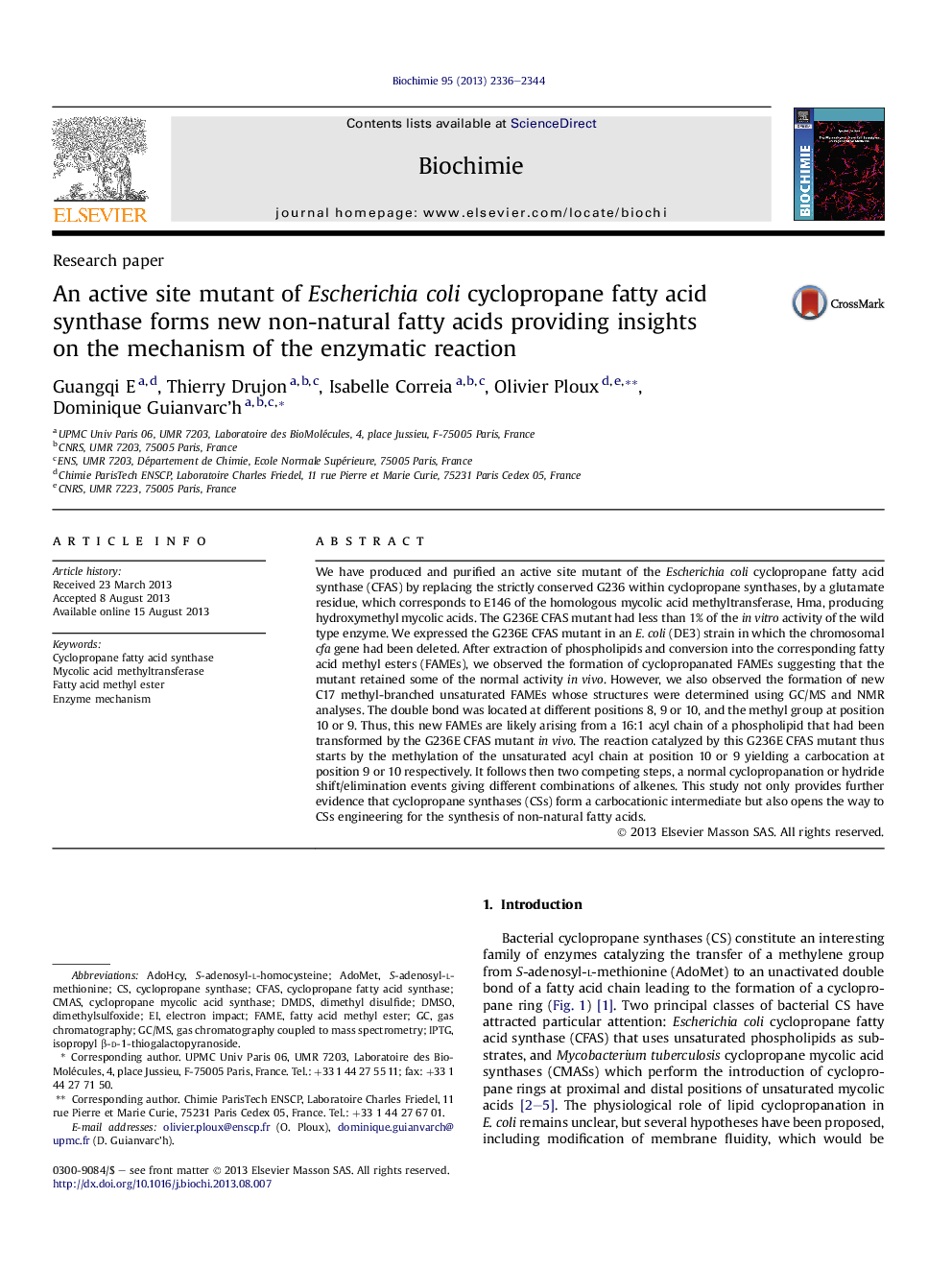| کد مقاله | کد نشریه | سال انتشار | مقاله انگلیسی | نسخه تمام متن |
|---|---|---|---|---|
| 10803662 | 1057176 | 2013 | 9 صفحه PDF | دانلود رایگان |
عنوان انگلیسی مقاله ISI
An active site mutant of Escherichia coli cyclopropane fatty acid synthase forms new non-natural fatty acids providing insights on the mechanism of the enzymatic reaction
ترجمه فارسی عنوان
یک جهش فعال در محل پروتئین اسید چرب اشرشیا کولی، سیکلوپروپان اسید چرب باعث ایجاد اسیدهای چرب غیر طبیعی می شود که از بین می رود. مکانیسم واکنش آنزیمی
دانلود مقاله + سفارش ترجمه
دانلود مقاله ISI انگلیسی
رایگان برای ایرانیان
کلمات کلیدی
CMASCyclopropane fatty acid synthaseIPTGAdoMetDMDSS-adenosyl-l-homocysteineAdoHcyCFAsDMSO - DMSOGC/MS - GC / MSS-adenosyl-L-methionine - S-adenosyl-L-metionineisopropyl β-D-1-thiogalactopyranoside - ایزوپروپیل β-D-1-thiogalactopyranosideElectron impact - تاثیر الکترونیdimethyl disulfide - دی متیل دی سولفیدDimethylsulfoxide - دیمتیل سولفواکسیدFAME - فامFatty acid methyl ester - متیل استر اسید چربEnzyme mechanism - مکانیزم آنزیمgas chromatography coupled to mass spectrometry - کروماتوگرافی گاز همراه با طیف سنجی جرمیGas chromatography - کروماتوگرافی گازی
موضوعات مرتبط
علوم زیستی و بیوفناوری
بیوشیمی، ژنتیک و زیست شناسی مولکولی
زیست شیمی
چکیده انگلیسی
We have produced and purified an active site mutant of the Escherichia coli cyclopropane fatty acid synthase (CFAS) by replacing the strictly conserved G236 within cyclopropane synthases, by a glutamate residue, which corresponds to E146 of the homologous mycolic acid methyltransferase, Hma, producing hydroxymethyl mycolic acids. The G236E CFAS mutant had less than 1% of the in vitro activity of the wild type enzyme. We expressed the G236E CFAS mutant in an E. coli (DE3) strain in which the chromosomal cfa gene had been deleted. After extraction of phospholipids and conversion into the corresponding fatty acid methyl esters (FAMEs), we observed the formation of cyclopropanated FAMEs suggesting that the mutant retained some of the normal activity in vivo. However, we also observed the formation of new C17 methyl-branched unsaturated FAMEs whose structures were determined using GC/MS and NMR analyses. The double bond was located at different positions 8, 9 or 10, and the methyl group at position 10 or 9. Thus, this new FAMEs are likely arising from a 16:1 acyl chain of a phospholipid that had been transformed by the G236E CFAS mutant in vivo. The reaction catalyzed by this G236E CFAS mutant thus starts by the methylation of the unsaturated acyl chain at position 10 or 9 yielding a carbocation at position 9 or 10 respectively. It follows then two competing steps, a normal cyclopropanation or hydride shift/elimination events giving different combinations of alkenes. This study not only provides further evidence that cyclopropane synthases (CSs) form a carbocationic intermediate but also opens the way to CSs engineering for the synthesis of non-natural fatty acids.
ناشر
Database: Elsevier - ScienceDirect (ساینس دایرکت)
Journal: Biochimie - Volume 95, Issue 12, December 2013, Pages 2336-2344
Journal: Biochimie - Volume 95, Issue 12, December 2013, Pages 2336-2344
نویسندگان
Guangqi E, Thierry Drujon, Isabelle Correia, Olivier Ploux, Dominique Guianvarc'h,
